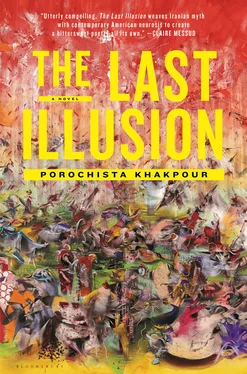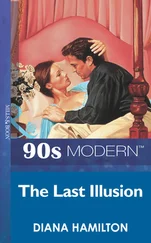“No,” Zal said, backing up. “It’s okay. It’s better this way.”
“You can stay here as long as you want, Zal,” Hendricks said, the only thing he could think of saying. “We can get rid of your apartment even, if you’d like. It doesn’t mean you’re not normal. .” But the way he said normal, more softly than the rest of the words, expressed a world of other things.
Zal shrugged. “It won’t matter. None of this will matter. I didn’t make any difference. I wasn’t of any consequence. I know that. I can prove that.”
Hendricks tried to nod as he took in those clashing words, but he found himself slowly shaking his head. “Are you okay, son?”
Zal paused and looked out at the blaring September sunshine. “I don’t know. But I do know that’s not the point. I know that doesn’t matter.” He paused again. “I know that now. So in a way, I guess I am okay.”

September 10, 2001. Zal woke from a dream that was all audio, all questions and answers, like a radio quiz show, all answered by the voice of a man he did not know. Question: How does anyone know one exists? Answer: You know when you cease to exist. Question: How does anyone know you were ever there? Answer: It becomes evident once you disappear.
He shook it off and sat up and turned on the TV. When he saw Silber, somehow he felt no surprise. It made perfect sense that his would be the first face before Zal that day. Silber was on The Early Show that morning, chatting about the stunt, but not quite himself: he was strangely dressed like a sober businessman, in a black suit, white shirt, and black tie. There was nothing showman-like about him. No Silberisms in his speech even. Zal listened closely and was only partially amazed to hear their conversation about Asiya and the meaning in bits and pieces.
Silber: “I think they’re buildings that New York has never known what to do with. What do they symbolize? Money? Sure, money. But there’s all sorts of firms there, shops, restaurants, bars, everything. You have all walks of life, working away halfway up to heaven. What’s more New York than that? And so it is a symbol of the city. A symbol nobody ever really bothered to recognize but now will have to. . once it’s gone. I think most people don’t even think about it in our skyline, but once it’s gone they will — it’ll be like a person with a limb missing. Sometimes you have to take away something, if even just momentarily, for people to appreciate it, to really see it, read it, understand it, get the meaning. Do you dig me?”
The news anchor was smiling widely and vacantly. “Mr. Silber, thank you for being with us this morning. We wish you the best of luck.” She turned to face the home audience. “And if you’re not fortunate enough to actually be at Battery Park, in lower Manhattan, tomorrow, you can catch Bran Silber’s Fall of the Towers live on our show tomorrow morning, 8:30 a.m., when we begin our coverage. We can’t wait, Mr. Silber!”
“Thank you,” he said simply, with the smallest of winks.
So what was there for Zal to do but contemplate attending? He imagined Asiya in her cell— her cage, my God— noticing the date, closing her eyes and keeping them closed till tomorrow’s time was up. She would be sitting cross-legged, like a swami cut off from the world, blind and deaf, and yet ready. She wanted him to be there, he knew that. Since she and he had failed, had not been able to stop the thing from happening, what difference did it make to be “safe” or in the line of fire? It was all over. Might as well have front-row seats, he thought she’d be thinking.
And so for the first time in days, he got up, dressed, shaved, and put on shoes.
“Where are you going?” Hendricks wondered. He himself had taken many days off to be with Zal.
“I’m going away, Father,” Zal said, and then clarified, “For a while. Till tomorrow. I want to do some things, take some walks, go to the apartment, maybe stay the night there.”
Hendricks shook his head, not buying it. “Does this have to do with Asiya?”
Zal shook his head. “No, really.”
“Does this have to do with the Silber act?”
Zal sighed. “Partially. Yes. I want to be there. Tickets are sold out, so I’d have to get there before, way before. Anyway, I want to see the scene, what they’re up to. Really, I feel better. This is a good thing.”
Zal wished that, like all other people, he could insert a smile there to console his father, but he just stood there, with his always-blank face, trying to transmit sincerity and wellness.
“Zal, I’m not convinced you’re well enough,” he said.
“I can’t live like this, Father,” Zal said. “I can’t be kept here like. .” He was about to say “like in a cage ,” but he stopped himself. “Eventually, I have to move on. Look, everything is okay. Asiya is cut off from me. I’ve gotten rest. What’s done is now done. We’ll wait, we’ll see.”
And suddenly it occurred to him that he may never see Hendricks again. And for a moment he did not want to leave, either.
“The only thing that’s important now is one thing,” Zal said, his voice cracking slightly as he tried hard to rein in any telltale emotion, not wanting to alarm Hendricks any more than he already had. “I hope you know how much I have appreciated you all this time and how much I truly love you, Father.”
Hendricks turned a bit red, unused to such declarations from Zal.
“I meant that,” Zal went on. “You saved my life. Over and over. You did it when you first adopted me and then you did it by raising me. And now in this difficult period, I’ve come to you over and over in pieces and you’ve put me back together. I owe you my life.”
Tears welled up in Hendricks’s eyes. He looked down, wanting to hide it. “You don’t owe me anything, son. You’ve saved me as well. I love you more than anything I have ever loved.”
They embraced, Zal holding on longer and harder than Hendricks expected. He thought about worrying about it. But he had heard Zal; his worries were nothing but negativity. Zal was feeling better. And Zal was free. He had to be free. He had raised him against all odds to get to this point, after all.
And with that, Zal left. Hendricks was heartened that all his belongings, all his mess, was left behind. It made him feel like nothing was changing that much.
But something was. Zal could feel it in the air. New York felt different. In some ways, the city felt thrilling. His imagination was running wild, eyeing every person — man, woman, and child — all the potential, all the possibility. He closed his eyes and tried to conjure Asiya, too, with closed eyes herself, and he tried to send her a mental message. Asiya, he thought, I did love you. And if it turns out the way it likely will, I’m sorry I couldn’t do anything. I’m sorry I didn’t altogether believe you.
And as he scanned the city streets, he thought about how they were trapped on this island that was now overfilling with the insane potential of miracle and disaster stirred together. Asiya, wherever she was, encaged, might actually make it, ironically. She might be the only one to live to tell the story.
Zal brushed the ideas out of his head and went to his old apartment. He had left only a few things behind, things he didn’t need, like the suit his father had sent him for the trip to Las Vegas to see Silber. How fitting that he’d be back in that outfit for this final act. He put on the suit, a bit overwhelmed by its smell of another time — that dinner at the top of the World Trade Center that had triggered it all — moved by how doubly fitting it could all be, and he left his old home.
Читать дальше













